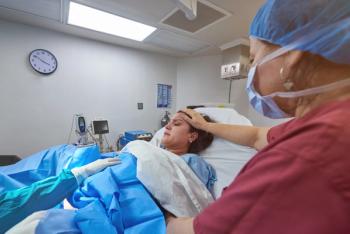
Although women face many obstacles to first-trimester abortion, challenges to second-trimester abortion are even greater.

Although women face many obstacles to first-trimester abortion, challenges to second-trimester abortion are even greater.

Although residency teaches doctors to deliver babies, how to deliver bad news must also be a part of the curriculum.

Ob/gyn, while late to the game, has the potential to climb the ranks as the specialty most instrumental to the use and development of AI.

In a first-of-its-kind study, Canadian researchers explored how antidepressants and duration of use affects gestational diabetes mellitus risk.

A recently published study investigated whether maternal red blood cell (RBC) lead exposure is associated with intergenerational overweight and or obesity (OWO).

From research on whether high-risk pregnancies are receiving the proper level of care to a 40-year study on hypertension in pregnancy, these are five of the most noteworthy obstetric-focused studies published in September 2019.

A cohort study of more than a half million individuals suggests that maternal anemia in early pregnancy may have a negative impact on a fetus’s neurodevelopment.

A recent study sought to estimate the degree to which women at high risk for developing severe maternal morbidity deliver at appropriate levels in maternal care centers.

The following eight topics should be discussed with patients in order to provide the best postpartum care.

Ob/gyns sometimes need to go beyond guidelines when making judgment calls, as is the case with whether to induce at 37 weeks for gestational hypertension.

New research explored whether risk of wrong-patient orders increased among multiple-birth infants compared with singleton-birth infants in the NICU.

Ranging from a comparison between hospital and home births to an update from the CDC on infant mortality, these are five of the most noteworthy obstetric-focused studies published in August 2019.

A recent study compared labor care processes and birth outcomes between births in medical centers with both midwives and physicians versus those receiving only physician care.

A recent study evaluated whether an institutional policy of universal perinatal depression screening would increase screening frequency and treatment after a positive test result.

While water fluoridation has great benefits for tooth decay prevention, research indicates that in pregnant women, fluoride crosses the placenta and accumulates in brain regions involved in learning and memory.

Ranging from the impact diet supplements have on heart health to whether cannabis use impacts a woman's risk for PTB, these are five of the most noteworthy studies published in July 2019.

Environmental health occupies a unique place in perinatal and reproductive health counseling

More than half of rural counties in the United States have no hospital obstetrical services, many remaining services are closing at a frightening pace, and maternal and perinatal mortality and/or morbidity are rising as a consequence.

Recent studies suggest that a progestin-induced withdrawal bleed may reduce conception and live birth rates in women undergoing ovulation induction with clomiphene citrate.

A fast and cost-effective new dipstick test for Zika virus can distinguish between it and dengue viruses without cross-reactivity, according to a report in Science Translational Medicine. Also, results of a new randomized controlled trial-the largest of its kind to date-suggest that text messaging may help some pregnant women quit smoking.

This article addresses common errors that lead to litigation involving ob/gyn ultrasound, with options to reduce ultrasound-related litigation.

Data from more than 1.9 million subjects shows that women with endometriosis have a statistically higher risk of obstetric complications including preterm birth (PTB) than those without the condition.

One study looks at how successful the 9vHPV vaccine is in preventing HPV-related cervical, vaginal, and vulvar diseases. Plus: FDA approves first neonatal MRI. Also, researchers note that obstetric services in rural areas severely lacking.

Expert commentary on Practice Bulletin No. 163: Screening for fetal aneuploidy.

A study looks at the efficacy of aspirin in reducing preterm preeclampsia. Plus: The CDC reports on antidepressant use in the United States. Also, a look at whether vaginal estrogen postmenopause increases the risk of heart disease and certain types of cancer.